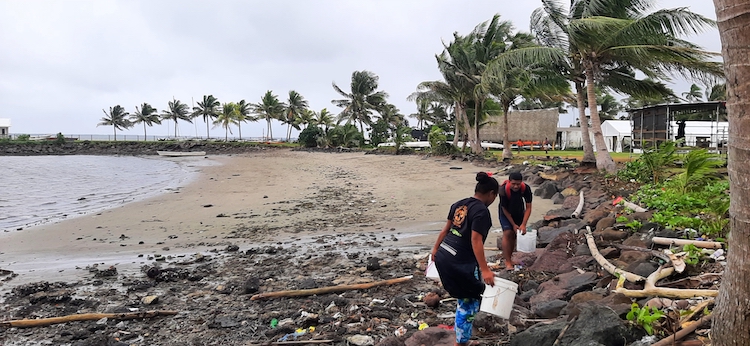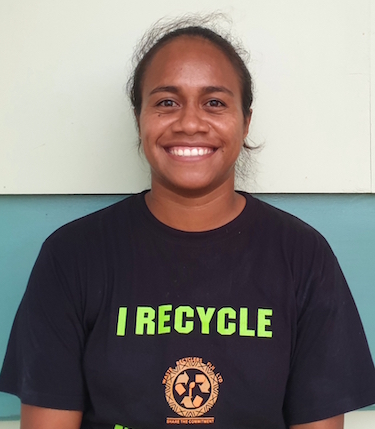Related News

Youths clean up at the beach adjacent to The University of the South Pacific’s marine campus in Suva. Picture: KIM RABUKA
By KIM RABUKA
Suzanne Turaganiwai, a marine activist and ocean advocate, is educating youths and communities on how to manage waste to keep the environment clean.
The 29-year-old manages the marine debris activism account on Instagram called ‘Benu ni waitui‘.
“It’s looking at highlighting the impacts of marine pollution on the environment and also to showcase the different items that wash up here on the beaches in Suva. The goal is to also upcycling these items into art and advocate for clean ocean for Fiji,” she told Wansolwara.
Suzanne holds activism workshops with various organisations in the hopes of sparking conversations that lead to actions for a cleaner environment.
It was during the second pandemic wave last year that Suzanne decided to give a go on this movement.
“I happened to be one of the lucky staff that were allowed to come back on to campus during the lockdown, and I spent most of my free time just coming to the beach collecting things,” she said.

“I decided to do something about the rubbish problem that you see here. I also have a background in marine science, so that sort of added to the value of work that I was doing.”
Suzanne is also a graphic designer and artist and says it makes sense to do something creative with the clean-ups.
“I had the time last year to do it, and it’s getting busier now with things going back to normal,” Suzanne highlighted.
“In a way, it has improved because there are more people involved and it built a community of people working every week to clean the environment.
“I would share the news about what and when we collect on my social media pages for interested people. We have some students, staff and members from outside the USP community that come in to help as there are no fees required for this.”
Suzanne says they are looking to engage more students on campus in extracurricular activities involving clean-ups and data collection at USP foreshore and also participate in activities such as upcycling marine litter into art and advocacy.
“Some more interesting pieces like the pegs and bottle tops are used for art projects. These items also included toys, but recyclables like bottles and plastic bags are sorted out with the team and sent to the recyclers or keep them ourselves and take it to Mission Pacific,” explained Suzanne. “Last week, we had an ocean festival that the Pacific Council of Churches organized. And we participated by having a mural-making thing where kids came and got their hands into the rubbish and did some artwork.”
For the remaining half of the year, Suzanne plans to conduct activism workshops and an exhibition of art pieces of marine debris.
“We’re also hoping to engage further into more communities, especially with the work we are doing at Pacific Ocean Litter Youth Project,” she said.
“Right now, we’re focused on one site, that is here at USP foreshore, but we’re hoping to expand to some rural areas or some semi-urban sites just to look at the different types of litter coming in and do more advocacy work.
“We are looking to pull in more youths and women especially into these kinds of projects because artivism is sort of like your arts and craft, and I’m sure women would be interested in taking up that skill or even benefit and sell their creations.”
Her message would be to live “a bit more sustainably”.
“It may be hard to live that way in the city but do your research, read about ways in which you can minimize your carbon footprint and change your lifestyle a bit because the way that we are living, the path that we’re on and have been going on for the past few decades have always been about consumption,” she told Wansolwara.
Suzanne adds that people do not realise the amount of waste that is being made.
“The products that we buy, the services that we use, it’s always just more of this, never thinking about the output of our actions. So we need to take a step back and slow down,” says the young sustainable living activist.
“For young people looking to upskill their talents and passions, do not be afraid to step out of your comfort zone,” says Suzanne.
“Talk to the right people. Only then will you find your way in whatever niche you’re in or activities you want to pursue.”
* Kim Rabuka is a third-year journalism student at The University of the South Pacific’s Laucala campus, Suva.